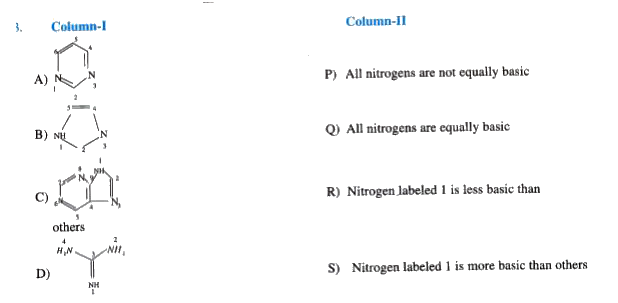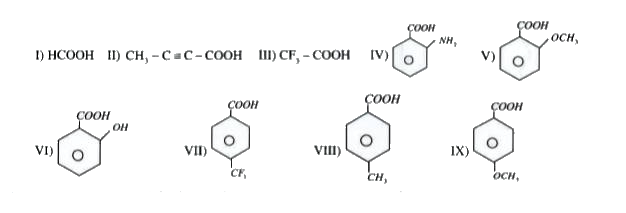Mesomerism is extended resonance. Atoms or groups with lone pairs of electrons release electrons when connected to doubly bonded carbons. It is +M effect. Unsaturated groups when connected to doubly bonded carbons withdraw π electrons from the doubly bonded carbons. It is -M effect. Here the double bond is the unsaturated group should be between less electronegative atom and more electronegative atom.

Mesomeric effect stabilizes or destabilizes the conjugate base of an acid. As a result the acid may be strong or weak  has 4(OH) groups. Which -OH is a strong acid?Solution in Telugu
has 4(OH) groups. Which -OH is a strong acid?Solution in Telugu
S
R
Q
P
The correct Answer is:D
Step by step video & image solution for Mesomerism is extended resonance. Atoms or groups with lone pairs of electrons release electrons when connected to doubly bonded carbons. It is +M effect. Unsaturated groups when connected to doubly bonded carbons withdraw pi electrons from the doubly bonded carbons. It is -M effect. Here the double bond is the unsaturated group should be between less electronegative atom and more electronegative atom. Mesomeric effect stabilizes or destabilizes the conjugate base of an acid. As a result the acid may be strong or weak has 4(OH) groups. Which -OH is a strong acid? by Chemistry experts to help you in doubts & scoring excellent marks in Class 11 exams.
Updated on:21/07/2023Topper's Solved these Questions
- ELECTRONIC EFFECTS AND REACTION INTERMEDIATESBOOK - AAKASH SERIESCHAPTER - ELECTRONIC EFFECTS AND REACTION INTERMEDIATESEXERCISE - LECTURE SHEET - EXERCISE-III (Matrix Matching Type Questions)
1 Videos
- ELECTRONIC EFFECTS AND REACTION INTERMEDIATESBOOK - AAKASH SERIESCHAPTER - ELECTRONIC EFFECTS AND REACTION INTERMEDIATESEXERCISE - LECTURE SHEET - EXERCISE-III (Integer Type Questions)
11 Videos
- ELECTRONIC EFFECTS AND REACTION INTERMEDIATESBOOK - AAKASH SERIESCHAPTER - ELECTRONIC EFFECTS AND REACTION INTERMEDIATESEXERCISE - LECTURE SHEET - EXERCISE-III (More than correct answer Type Questions)
6 Videos
- ELECTRON MIGRATION EFFECTS BOOK - AAKASH SERIESCHAPTER - ELECTRON MIGRATION EFFECTS EXERCISE - QUESTIONS FOR DESCRIPTIVE ANSWERS
10 Videos
- ELEMENTS OF BORON FAMILYBOOK - AAKASH SERIESCHAPTER - ELEMENTS OF BORON FAMILYEXERCISE - OBJECTIVE EXERCISE - 3
7 Videos
Similar Questions
Match the following columns

View SolutionHow many of the following acids are more acidic than benzoic acid?

View SolutionThe following are more acidic than

View SolutionHyperconjugation effect is also termed as 'no bond resonance'. Why?
View SolutionWhich one of the following compounds is not a protonic acid ?
View SolutionThe resonance effect is defined as 'the polarity produced in the molecule by the interaction of two pi -bonds or between a pi -bond and lone pair of electrons present on an adjacentatom.' The effect is transmitted through the chain. In positive resonance effect, the transfer of electrons is away from an atom or substituent group attached to the conjugated system. This electron displacement makes certain positions in the molecule of high electron densities. In negative resonance effect, the transfer of electrons is towards the atom or substituent group attached to the conjugated system. Which of the following does not show resonance effect ?
View SolutionThe resonance effect is defined as 'the polarity produced in the molecule by the interaction of two pi -bonds or between a pi -bond and lone pair of electrons present on an adjacentatom.' The effect is transmitted through the chain. In positive resonance effect, the transfer of electrons is away from an atom or substituent group attached to the conjugated system. This electron displacement makes certain positions in the molecule of high electron densities. In negative resonance effect, the transfer of electrons is towards the atom or substituent group attached to the conjugated system. Which of the following shows +M effect ?
View SolutionThe resonance effect is defined as 'the polarity produced in the molecule by the interaction of two pi -bonds or between a pi -bond and lone pair of electrons present on an adjacentatom.' The effect is transmitted through the chain. In positive resonance effect, the transfer of electrons is away from an atom or substituent group attached to the conjugated system. This electron displacement makes certain positions in the molecule of high electron densities. In negative resonance effect, the transfer of electrons is towards the atom or substituent group attached to the conjugated system. What is the IUPAC name for :
View SolutionThe resonance effect is defined as 'the polarity produced in the molecule by the interaction of two π-bonds or between a π-bond and lone pair of electrons present on an adjacentatom.' The effect is transmitted through the chain.
In positive resonance effect, the transfer of electrons is away from an atom or substituent group attached to the conjugated system. This electron displacement makes certain positions in the molecule of high electron densities. In negative resonance effect, the transfer of electrons is towards the atom or substituent group attached to the conjugated system.
Which of the following free radicials is the most stable ?
View SolutionA double bond is formed between carbon atoms by …………… pairs of electrons.
View SolutionA permanent effect in carbon chain compounds in which electrons forming a bond between a carbon atom and another atom are partially displaced towards the atom with greatest electronegatively , is called________.
View SolutionExplain each of the following observations: (iv) The -C""Cl_3 group is a m-directing group, even though the carbon atom is not bonded to a more electronegative atom by a double or triple bond.
View SolutionUnsaturated hydrocarbons that have tri-bonds between carbon-carbon atoms are called
View SolutionInductive effect is the permanent displacemetn of electrons along a carbon chain when some atom or group of atoms with different electronegativity than carbon is attached to carbon chain
View SolutionMesomeric or resonance effect is a permanent effect involving the transfer of electrons relayed through pi electrons of multiple bonds or a lone pair of electrons and multiiple bonds in a chain of carbon atoms in a molecule
View Solution
